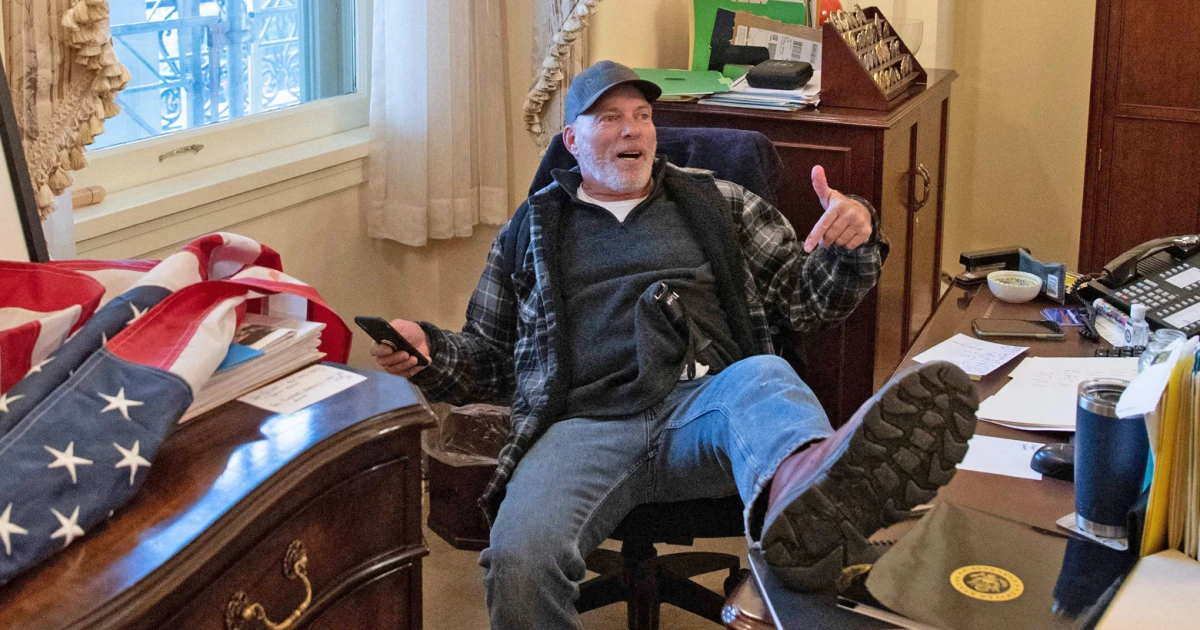Kerry Howard Mwesigwa
Richard “Bigo” Barnett, a participant in the January 6th Capitol riot, has been sentenced to four-and-a-half years in prison for his involvement in the attack on the US Capitol. Barnett gained notoriety for being photographed with his feet on House Speaker Nancy Pelosi’s desk during the riot. After a two-week trial, he was found guilty on eight counts, including civil disorder, obstruction of an official proceeding, and theft of government property. This article provides a comprehensive overview of Barnett’s case, the charges against him, the trial proceedings, and the final sentencing.
On January 6, 2021, supporters of then-president Donald Trump stormed the US Capitol, disrupting the certification of Joe Biden’s victory in the 2020 presidential election. Barnett, armed with a stun gun concealed within a collapsible walking stick, entered the Capitol and made his way into Nancy Pelosi’s office. He was photographed with his feet on her desk, stole a piece of her mail, and left a note with a derogatory message.
During the trial, Barnett claimed that he was swept along with the crowd and entered Pelosi’s office unintentionally while looking for a bathroom. He testified that he struck a pose at the photographers’ request to “act natural.” However, the evidence presented, including his use of a bullhorn to address the crowd and his social media posts after the riot, indicated his active participation.
Barnett faced multiple charges, including civil disorder, obstruction of an official proceeding, entering and remaining in a restricted building or grounds with a deadly weapon, disorderly conduct in a restricted building or grounds with a deadly weapon, theft of government property, and other related offenses. The jury found him guilty on all eight counts, consisting of both felony and misdemeanour charges.
Throughout the trial, Barnett’s defense argued for a maximum sentence of one year, highlighting that he had not physically harmed anyone or caused property damage. On the other hand, the prosecution sought a sentence of 7.25 years, emphasizing the seriousness of the charges and the threat Barnett posed to law enforcement and public safety during the riot.
U.S. District Judge Christopher R. Cooper sentenced Barnett to serve four-and-a-half years in prison, along with ordering him to pay restitution and court fees. The judge also imposed a three-year probation period after his release. Barnett will receive credit for the four months he already spent in the District of Columbia jail.
Barnett expressed his intention to appeal the conviction, maintaining that the government had targeted him due to the widely circulated photo of him with his feet on Pelosi’s desk. His defense argued that he was being punished for becoming a symbol of the riot. However, the judge dismissed these claims, stating that Barnett had not shown any responsibility for his actions and that the severity of his conduct warranted a significant sentence.
Richard “Bigo” Barnett’s sentencing to four-and-a-half years in prison for his involvement in the January 6th Capitol riot highlights the legal consequences faced by individuals engaged in the attack on the US Capitol. The trial proceedings revealed Barnett’s active participation in the events and his disregard for the rule of law. The judgment sends a strong message regarding accountability for those who undermine democratic processes and engage in violent acts to further their political agendas.















